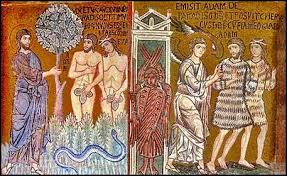“Oh, it’s Christmas Eve! I wonder – what presents should I give to everybody this year?” You know how well that would not work.
It’s the same with Lent. That’s why the Church gives us the season of Pre-Lent – so we won’t get to Clean Monday (March 11 this year) and say “Already? What shall I do for Lent this year?”
No. Get yourself ready for Lent. Now!
Pre-Lent
– which this year began on Sunday February 17. The date varies according to the date of Pascha.
Now, the purpose of Lent is not to give up cheeseburgers for a few weeks and then start eating them again. Big deal.
The purpose of Lent is to get our lives back in order, get  ourselves headed in the right direction again. Lent is our annual shape-up time – “spring training” to get us ready for the summer season. We all tend to stray from the straight and narrow, don’t we? In many ways. Maybe it’s our prayer life. Maybe we’re not forgiving or apologizing as we should. Maybe we just need to lose some weight. (That’s not the chief purpose of Lent, but we are responsible to God to care for the bodies he gave us.) Maybe we’ve fallen into a particular sin. Many possibilities. Lent is the time catch ourselves before we go too far and lose control.
ourselves headed in the right direction again. Lent is our annual shape-up time – “spring training” to get us ready for the summer season. We all tend to stray from the straight and narrow, don’t we? In many ways. Maybe it’s our prayer life. Maybe we’re not forgiving or apologizing as we should. Maybe we just need to lose some weight. (That’s not the chief purpose of Lent, but we are responsible to God to care for the bodies he gave us.) Maybe we’ve fallen into a particular sin. Many possibilities. Lent is the time catch ourselves before we go too far and lose control.
So now, plan which virtues should you work on during Lent. Which sins and failings should you try to overcome? How should you fast? What should your Lenten Rule be?
Scripture readings on our four Pre Lenten Sundays advise us how to keep a good Lent. These are the Sundays of 1 the Publican and Pharisee, 2 the Prodigal Son, 3 the Last Judgment, 4 Forgiveness.
1. The Sunday of the Publican and Pharisee
…which this year was February 17.
Gospel: Luke 18:10-14
Pharisees, I think you know, were the best religious people, “pillars of the temple”, so to speak. They kept the Old Testament Law, all the detailed prescriptions to perfection and then some. The Law required a tithe of one’s possessions, 10% to the temple. Jesus mentioned that the Pharisees went beyond that. They tithed even on their cooking herbs – rue and dill and cumin. Matthew 23:23 Pharisees – everyone admired them.
Publicans (public officials), on the other hand, were traitors who hired themselves out to the Roman occupiers. They collected taxes. The system allowed them to take bribes from the rich so they wouldn’t have to pay, but to pressure ordinary people to pay extra. (Does this sound vaguely familiar?) Then they would send their quota to Rome and keep the rest for themselves. Remember, Zacchaeus the tax collector promised Jesus he would repay anybody he had cheated four-fold. Matthew 14:8 Publicans – everyone despised them.
So a Pharisee and a Publican went up to the temple to pray.  The Pharisee prayed (I paraphrase slightly): I give 10% to the church. I don’t eat meat on Wednesday and Friday. I keep the Lenten fast to perfection. I sing in the choir and am on the parish council. I am better than other men – like that tax collector over there. Now, on the surface, this was true. I mean, is it better to support the church and keep the fast than it is to lie and cheat and steal and oppress people? Of course it is.
The Pharisee prayed (I paraphrase slightly): I give 10% to the church. I don’t eat meat on Wednesday and Friday. I keep the Lenten fast to perfection. I sing in the choir and am on the parish council. I am better than other men – like that tax collector over there. Now, on the surface, this was true. I mean, is it better to support the church and keep the fast than it is to lie and cheat and steal and oppress people? Of course it is.
Meanwhile the tax collector wouldn’t even lift up his head in prayer – he was too ashamed. He simply muttered, “God be merciful to me, a sinner”.
And Jesus said:”I tell you, this man went down to his house justified rather than the other.” God was more pleased with the sinful tax collector than with the virtuous Pharisee. I’ll bet that got everybody’s attention!
Humility vs. Pride
Why ever? There is a hint in the Lord’s description of the Pharisee: “He prayed thus with himself.” Outwardly the Pharisee was looking up to God, talking to God. But in fact he wasn’t really praying to God, he was talking to himself about himself: I am such a good man. I am better than other men. I am better than that man. A warning as we go into Lent, our time for intense prayer: It is possible to appear to be praying, even use words of prayer, while we’re not really focused on God at all.
While the tax collector, though he was ashamed to look up to God, was in fact praying: Lord have mercy on me. He wasn’t comparing himself to anybody. He was praying to God.
God is pleased by humility. He is displeased by pride. “Everyone who exalts himself will be humbled, and he who humbles himself will be exalted.” We hear this again and again in the Scriptures. The Virgin Mary summed it up in her song which we sing most mornings at Orthros (Matins): “My soul magnifies the Lord… He has scattered the proud in the conceit of their heart. He has put down the mighty from their seat and has exalted the humble.”
 Why so? Is it simply because God has told us being prideful is naughty? Is it because God looks at humble people and says to himself: “What a treat! I love to watch them grovel!” Of course not. Pride is punished and humility is rewarded because God has built this into the very nature of things. It’s because proud people rarely get better, they are pleased with themselves as they are – while humble people may well improve because they are not satisfied with themselves. And God, who loves us, wants us to grow up to amount to something.
Why so? Is it simply because God has told us being prideful is naughty? Is it because God looks at humble people and says to himself: “What a treat! I love to watch them grovel!” Of course not. Pride is punished and humility is rewarded because God has built this into the very nature of things. It’s because proud people rarely get better, they are pleased with themselves as they are – while humble people may well improve because they are not satisfied with themselves. And God, who loves us, wants us to grow up to amount to something.
False Pride, False Humility
Don’t misunderstand. The word pride can be used in different ways. It is right to take pride in your work, to do a good job. It is right for parents to take pride in their children and their accomplishments. This is proper pride, so long as we remember that all good things come from God, and we can’t claim we did it all by ourselves.
Likewise, by humility we don’t mean fake humility: “Lord, I’m a worm, I never do anything right, I am a total disaster, worth nothing”. That’s not humility, that neurosis. God declared us “very good”, created in his image. Each of us has good in us, has done good things. But I have also defaced that image. If I am to grow up to be like Jesus, completely filled with love of God and love of people, I have a long way to go. True humility is just being honest. The truth is that I have a lot to be humble about!
True Pride, True Humility
Look at it this way: Outwardly, at least, on a scale of 1 to 10 (1 being utterly wicked, 10 being like Christ) the Publican was, say, a 2 or 3. He wasn’t all bad. No one is. Maybe he loved his kids. Meanwhile, the Pharisee was perhaps a 4 or 5. Even the great saints, compared to what they will finally become, are maybe a 6 or 7 on earth. Here, even they aren’t perfected yet.
Here’s the point: the Pharisee, so long as he is self-satisfied, so long as he keeps comparing himself to the Publican, is almost certain to stay at 4. In fact he may even get worse, because even being a 3 is probably better than him, that 2 down there. And that’s what displeases God about pride. You can always find people who are worse than you – or who you think are worse than you. You don’t really know that. Much is hidden from us. And it is easy to find people to feel superior to – celebrities, media types, politicians. Do you really want to turn out to be like them? or worse than them? No? So compare yourself instead to the saints, to the  Theotokos, to Jesus Christ and what he calls you to be. Set your sights high. Go for the gold! The Pharisee, if he had done that, would have prayed with the Publican: “Lord, have mercy on me a sinner.”
Theotokos, to Jesus Christ and what he calls you to be. Set your sights high. Go for the gold! The Pharisee, if he had done that, would have prayed with the Publican: “Lord, have mercy on me a sinner.”
Meanwhile the Publican, so long as he knows he is a sinner, off the mark – there’s hope for him. It’s not guaranteed. Some people wind up simply wallowing in their sin and shame. But there was hope. And that is what pleases God. With that attitude the tax collector may someday be a 3, a 4, finally even a 10. That nasty tax collector Matthew became a saint, author of the Gospel according to Saint Matthew, and his icon is on our Gospel books on our altars. It can be done!
Moral for Lent
During Lent, during life, do not waste your time looking down on others. If  you’re tempted to talk about other peoples’ failings, or even think about them, let alone inform God about them (!), sit on it.
you’re tempted to talk about other peoples’ failings, or even think about them, let alone inform God about them (!), sit on it.
Who do you despise?… (out with it…) …Now, STOP! This may be fun but it’s dangerous. During Lent, during life, deal with your own sins and failings, not those of others.
As we pray in our Lenten Prayer of Saint Ephraim, “O Lord and King, grant me to see my own sins and not to judge my brother.” And you know that the favorite prayer of Orthodox Christians to this day is based on the prayer of the Publican: “Lord Jesus Christ, Son of God… have mercy on me a sinner.”
2. Sunday of the Prodigal Son
…which this year is February 24.
Gospel: Luke 15:11-32.
This Blog Post is going to be a bit long, since we’re scrunching up two Sundays together.
Like many of Jesus’ parables, this can be heard at more than one level.
 First, this is the story of mankind’s rebellion and the love of God the Father. The Prodigal Son is “Adam” – a name which in Hebrew means “man”, “mankind”. We are the Prodigal Son, created by God our Father to live in a bountiful garden, loved by God, loving God, with all good things given for us. But we wasted it, threw it away, and now
First, this is the story of mankind’s rebellion and the love of God the Father. The Prodigal Son is “Adam” – a name which in Hebrew means “man”, “mankind”. We are the Prodigal Son, created by God our Father to live in a bountiful garden, loved by God, loving God, with all good things given for us. But we wasted it, threw it away, and now  we’re living like this. When will we finally come to our senses and return to God? to our loving Father, who has now come running out to us in Jesus Christ (note the icon to the left), waiting to forgive us and welcome us home.
we’re living like this. When will we finally come to our senses and return to God? to our loving Father, who has now come running out to us in Jesus Christ (note the icon to the left), waiting to forgive us and welcome us home.
The parable is also the story of what was happening in the first century. The Gentiles who had strayed far from God were now returning to him, to Christ, to the Church. But the elder brother, the Jews who had never left God, were resentful. “Why is God welcoming them, while we have been faithful.” But were they… was the elder brother now being faithful? The greatest virtue is love – and if they were truly being faithful to God they would have been glad that the Gentiles were coming home.
The third meaning of the parable is the one most relevant to Lent, for it applies to us. We are to play the roles of two of the persons in the parable, and must avoid the third like the plague.
 1. You and I, each of us, are already the Prodigal Son. Prodigal means “recklessly wasteful”. You and I have taken our inheritance, the good things God has given us, and have wasted so much of it. When I think of the kind of person I could have become by now, if only… But often I am like the Prodigal Son “eating pig food”, wasting my time on nothing much or worse, when I could be in my Father’s house – walking with God surrounded by his love, doing worthwhile fulfilling things, being truly happy. It’s time for me to wake up and go home, repent, confess my sin and stupidity. If you think you haven’t sinned in this way, all I can say is you must have mighty low standards. Come to your senses. Head for home!
1. You and I, each of us, are already the Prodigal Son. Prodigal means “recklessly wasteful”. You and I have taken our inheritance, the good things God has given us, and have wasted so much of it. When I think of the kind of person I could have become by now, if only… But often I am like the Prodigal Son “eating pig food”, wasting my time on nothing much or worse, when I could be in my Father’s house – walking with God surrounded by his love, doing worthwhile fulfilling things, being truly happy. It’s time for me to wake up and go home, repent, confess my sin and stupidity. If you think you haven’t sinned in this way, all I can say is you must have mighty low standards. Come to your senses. Head for home!
2. We are also called to play the role of the Father. When someone has sinned against you, be eager to forgive. The father sees his son returning and hurries out to greet him. In those days fathers who had been offended were expected to wait, and then if the wayward son was abject enough he might forgive. But here the father makes a public spectacle of himself. (In those days everybody lived in town and could see this.) He runs out to the boy, so that before his son can say a word, he knows he is loved and will be forgiven. So you, like the father, be gentle with those who have offended you, quick to forgive.
Father. When someone has sinned against you, be eager to forgive. The father sees his son returning and hurries out to greet him. In those days fathers who had been offended were expected to wait, and then if the wayward son was abject enough he might forgive. But here the father makes a public spectacle of himself. (In those days everybody lived in town and could see this.) He runs out to the boy, so that before his son can say a word, he knows he is loved and will be forgiven. So you, like the father, be gentle with those who have offended you, quick to forgive.
 3. But we should never ever play the role of the elder brother. “Well! I have served you faithfully all these years, and here this son of yours squanders everything, and you throw a party for him! You never threw a party for me! it’s not fair.” The elder brother was right, of course. His younger brother had been a stupid irresponsible fool, and his father was not being fair. But what does that have to do with anything? The Christian way is not about fairness and justice. It’s about love and forgiveness and mercy and joy. If God were just with us, what hope would there be for any of us?
3. But we should never ever play the role of the elder brother. “Well! I have served you faithfully all these years, and here this son of yours squanders everything, and you throw a party for him! You never threw a party for me! it’s not fair.” The elder brother was right, of course. His younger brother had been a stupid irresponsible fool, and his father was not being fair. But what does that have to do with anything? The Christian way is not about fairness and justice. It’s about love and forgiveness and mercy and joy. If God were just with us, what hope would there be for any of us?
So, summing up, from this Second Sunday of Pre-Lent, here are Three Morals for Lent – and for life, remember.
1. When you have done wrong, like the Prodigal be tough on yourself.
Go to God, go to Confession and say you’re sorry. Get it out. Say it! Is this hard to do? Yes. Is this necessary? Yes. It’s the only way you’ll know with confidence that God forgives you, that he has already forgiven you.
2. When people have wronged you, like the Father be gentle with them.
Make it easy for them to say they’re sorry. Why do people often not apologize? Not because they’re not sorry, but because they fear if they say so, we’re going to jump all over them, reject them. No, be gentle. Be quick to forgive.
We’ll say more about apologizing and forgiving in the Post just before Forgiveness Sunday.
3. Never be resentful like the older brother.
Jesus said there is more joy in Heaven over one sinner who repents “than over 99 who need no repenting”. But who is this one person who needs no repenting? It certainly wasn’t the elder brother. He needed to repent for his lack of mercy and love and for his stupidity – for if he had truly loved his brother he too would have been glad he came home. Instead he was resentful, with what result? Now he’s missing the party! the joy which is the true inheritance of being part of our Father’s house. So now who was being recklessly wasteful? Now who was a prodigal son? Now who needed to repent and come home?
I hope he did. We don’t know. The parable ends there.
But our story hasn’t ended.  We still have time to repent, to forgive, to shape up and join the Paschal celebration. That’s what Lent is for.
We still have time to repent, to forgive, to shape up and join the Paschal celebration. That’s what Lent is for.
The “Lenten spring” is almost upon us. Prepare to enter into the Light!
Next Week: the Sunday of the Last Judgment
Week after Next: Forgiveness Sunday, the Church’s Last Minute instructions before we enter into Lent

Thank You and God Bless and Keep You!!